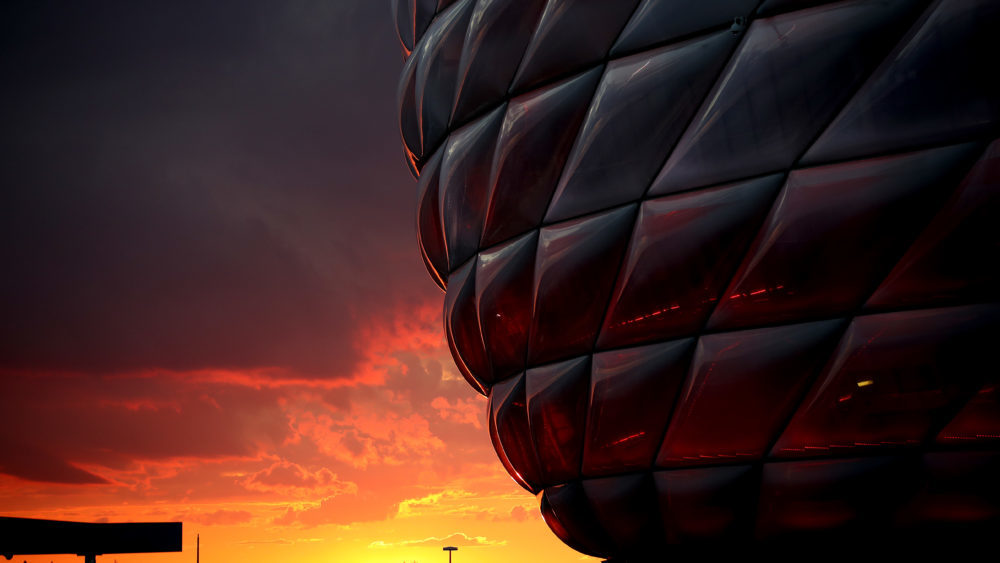15 YEARS FULL OF TITLES, TEARS, AND TRIUMPHS
It was with a heavy heart that the Bayern family left the Olympiastadion in early summer 2005 after it had been the home of the German record champions for decades. Now they left the center of the city for the north of Munich – into a spaceship.
The highlights from the last fifteen years in quick succession are: May 30, 2005: Official opening game by TSV 1860. May 31, 2005: First match of FC Bayern (against the national team). July 26, 2005: First competitive match in the late DFB League Cup. August 5, 2005: First Bundesliga game of Bayern. June 9, 2006: World Cup opening game. May 19, 2012: Lost in history. 2012 and 2014: Increase to 75,000 seats. July 2017: 1860 move out.
On the occasion of the 15th anniversary of the Allianz Arena, we asked our editorial staff and a number of guest authors to provide us with a special memory of theirs of the Arena. Stories about tears, shoot-outs and a particularly cold snowstorm.
FIRST DEFEAT IN A SNOWSTORM
By Günter Klein
One of the main reasons why FC Bayern did not to like the Olympiastadion any more was that when the weather was bad, you got soaked to the bone there. The opposite stand did not have a roof, but the wind drove the nasty rain onto the main stand as well. The VIPs in particular were exposed to this, which is why they always were equipped with blankets in FC Bayern red. The hope was that the Allianz Arena’s thorough protection from the elements would radiate comfort from now on. Wind, rain, snow – no more!
And so 2005/06 rolled around, the first season in Fröttmaning – the big weather test. Alas, the Arena did not pass it. However: It was a particularly severe winter; two games remained in my memory.
The first one came on February 12, 2006, a Sunday evening. FC Bayern played host to the 1st FC Nürnberg, they won 2-1, business as usual. But despite the win, the game must have been a huge disappointment for the crowds, because they had to realize that their new stadium could not protect them from extreme weather conditions. The day saw heavy snowfall with thick flakes which a stiff wind blew high up to the press gallery in what was supposed to be the actually protected upper area of the first stand. A white wet mush settled on the desks and the keyboards of the laptops everywhere. Another handicap for me was that I had returned from a skiing vacation with a broken thumb and had my left hand in a casket, which made typing difficult anyway. I even had to get out of my insulating jacket with one arm because my padded hand did not fit through the sleeve. In my way home, I cursed a bit about the Arena, but thought I had the worst game of the season behind me.
Then three weeks later, March 4, 2006: This date occupies a prominent place in the history of FC Bayern and the Allianz Arena because the team suffered their first Bundesliga defeat there. 1-2 against Hamburger SV (if you believe it). In the Mixed Zone – unforgettable – the then still active Hamburger Abendblatt reporter Dieter Matz told the astonished young players about other great victories in the history of the HSV. For once, the tables were turned: A journalist tells, the players listen. In the 89th minute, HSV scored the winning goal through Nigel de Jong. Deserved. They had led until the 83rd minute before Bayern drew level through Mehmet Scholl. At this time, the HSV had not yet become the laughing stock it later would become.
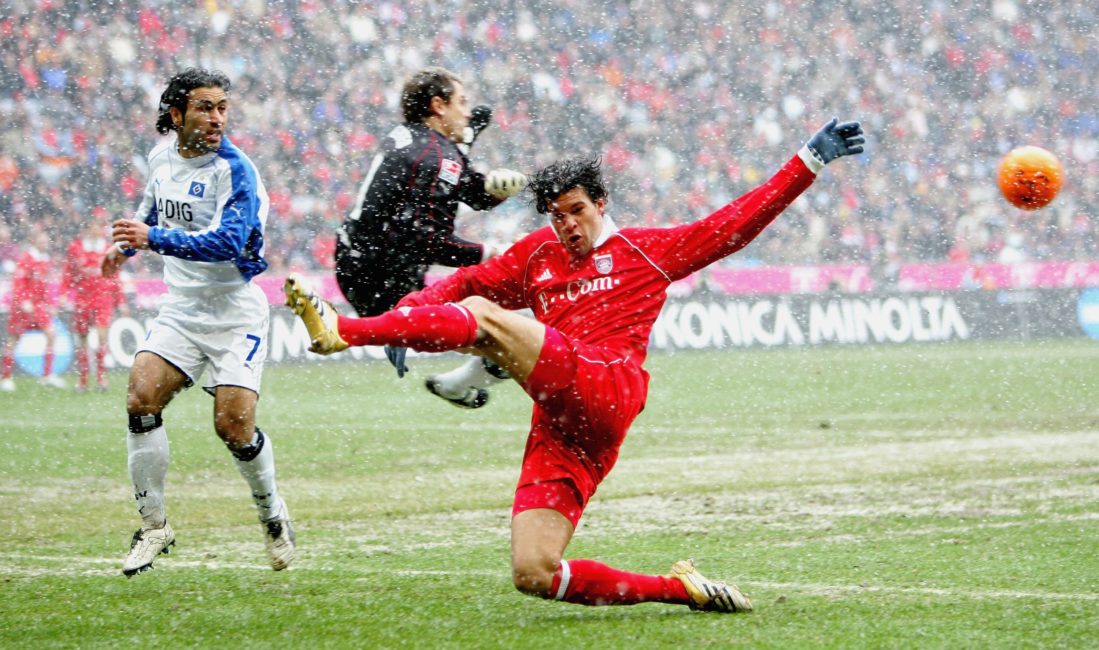
(Image: Alexander Hassenstein/Bongarts/Getty Images)
But what was even more remarkable – not unlike the game against the Club – was the weather situation. Real winter, torrents of snow. Back then, I lived 75 kilometers away from the Arena and was getting ready for a longer way home. As a journalist, you usually don’t leave until the interviews in the mixed zone are finished. It is difficult to leave during the first hour after the final whistle anyway. Usually the traffic around the stadium takes some time to calm down.
Not so on that 4th of March. The snowfall was incessant, the winter service of the Autobahn maintenance department was completely overwhelmed. In addition there was massive return traffic from the south, somewhere in Germany vacations came to an end. Around Dachau the endless stream of metal came to a standstill. The Red Cross began to give out hot tea to help the stranded travelers. The radio broadcast had a difficult time keeping abreast of all the public transports whose operations had been suspended in their announcements. No subways, no buses, no streetcars, no trains. I left the Autobahn as soon as the opportunity arose – and was lucky that on my alternative route my car just about fit under a tree that had fallen onto the highway. After 7:54 hours of driving, I finally pulled into my garage at home. I had missed the gym, but heard on the radio umpteen times that FC Bayern had lost.
At that time there were still three months to go until the World Cup in Germany. The summer fairytale. But after this winter, the country had earned the nice weather.
A VICTORY AGAINST DORTMUND AND FOR ENVIRONMENTAL AWARENESS
On April 6, 2019, FC Bayern beat Borussia Dortmund 5-0 in a thrilling home game, but what made my visit to the Arena in the 2018/19 season a very special one was not the game. It was that I experienced the reusable cup system in the stadium for the first time.
In November 2016 I spoke at the annual general meeting of FCB AG. Among other things I said:
I would like to see an FC Bayern that use reusable cups in the Allianz Arena in its responsibility for the environment. 16 million one-way plastic cups in 10 years of the Arena are enough!
In April 2017, I was able to discuss this topic with Uli Hoeneß during a longer in person discussion. He was enthusiastic about the suggestion and, in typical Hoeneß manner, wanted to clarify immediately in my presence with a phone call to Arena Managing Director Jürgen Muth how quickly the stadium’s drinks dispenser could be changed to reusable.
What neither Uli Hoeneß nor I knew was that the club had been thinking about a reusable cup system “for a long time”, which was about to be finally put on track.
First of all, 1860 Munich had to leave the Allianz Arena in 2017. This created the necessary free space in the stadium that was needed for the future cup logistics. New procedures were defined and tested with Bayern’s catering partner. The police had to give the green light for a certain type of cup that could not be used as a projectile. For this I was able to help FC Bayern with a tip.
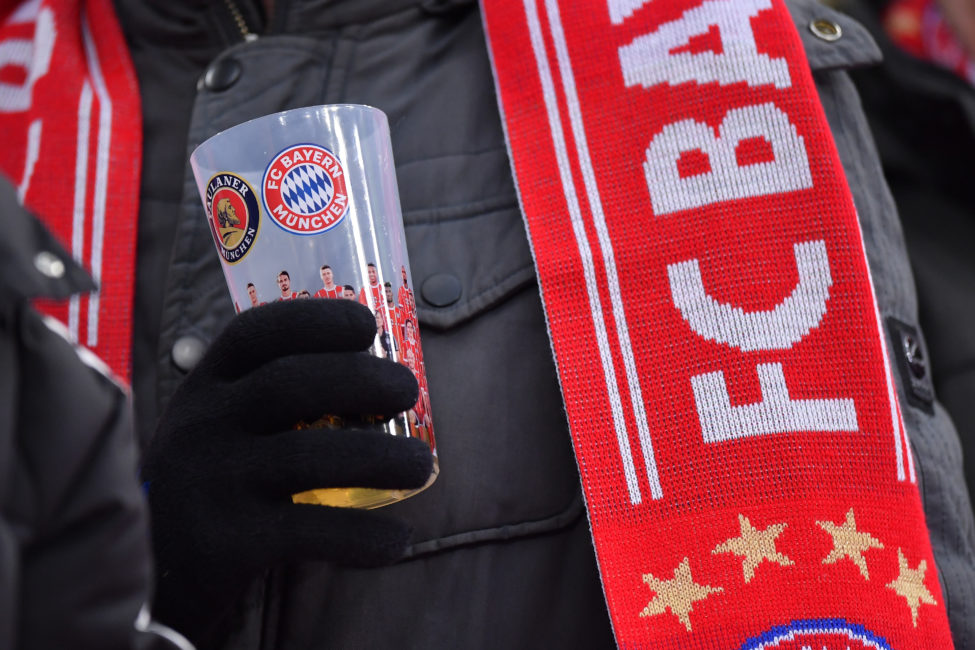
(Image: Sebastian Widmann/Bongarts/Getty Images)
Finally, during the 2018/19 season, the time had come. All parties involved were quite nervous. There was particular anxiety as to whether the fans would accept the new return system. But from the first day on, everything ran smoothly. Each season, around 1.6 million one-way cups are saved because of the use of disposable plastic cups in the Allianz Arena.
In my opinion, FC Bayern should not only shine on the pitch, but also off it. To see how the club, once convinced of the sensibility of the measure, acted so quickly and thoroughly in an environmentally friendly way here made me proud to be a Bayern fan once again.
THE SUGAR-SWEET END OF ROBBERY
Excitement on the final Bundesliga matchday – wait, what? But yes, on 18 May 2019, it actually happened. FC Bayern with coach Niko Kovač met his former club Eintracht Frankfurt with a draw being enough for winning the championship. Two points behind them was Borussia Dortmund, who had successively squandered what once had been a nine-point lead. And: The two FC Bayern legends Arjen Robben and Franck Ribéry should be given a fitting farewell after ten and twelve years respectively with the record champions.
So there was indeed something like excitement in the air. Not least because Eintracht had torn up the Europa League in the weeks before. With the so-called “buffalo herd” Sebastien Haller, Luka Jović and Ante Rebić up front, Frankfurt had stormed through to the semi-finals, only to be knocked out there against FC Chelsea. Instead of a thriller, however, the spectators in the Allianz Arena were treated to a Bayern holiday. Kingsley Coman alleviated the tension after only four minutes with the 1-0 opener. Haller scored a goal to level the score for the noticeably exhausted visitors after the break. Because Dortmund were leading 1-0 in Gladbach, Bayern at this point were top of the table on goal difference alone. With kind regards to Uli Hoeneß’ statement: “The goal difference does not interest me”.
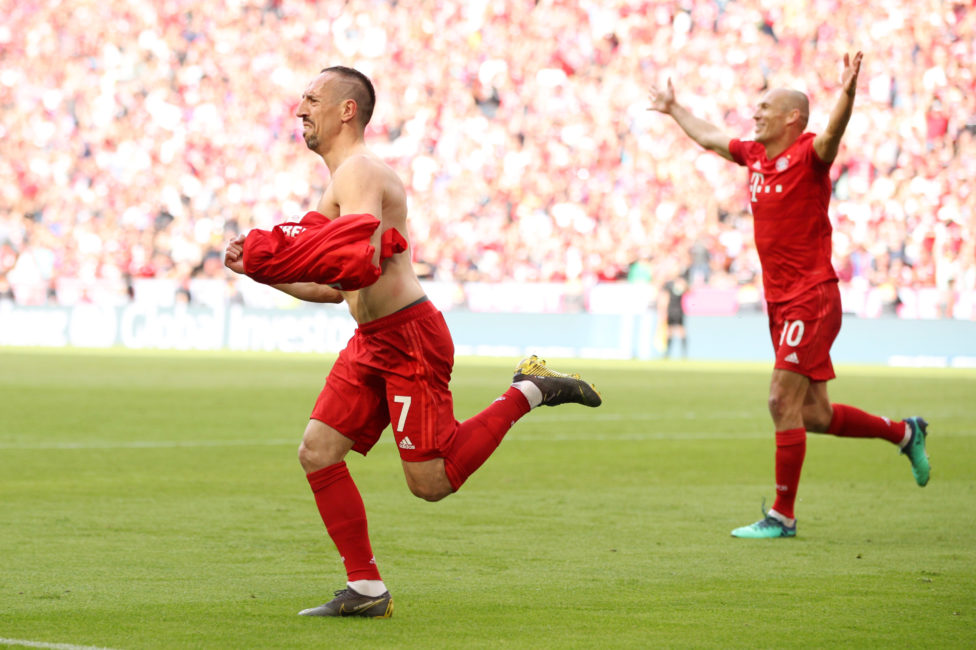
(Image: Adam Pretty/Bongarts/Getty Images)
Yet FC Bayern kept their nerves, David Alaba immediately scored the 2-1, and when Renato Sanches increased the score again, all dams broke in Munich. The Portuguese ran up and down the pitch in excitement, sliding on his knees towards Robben, Ribéry and Rafinha – the Brazilian also said goodbye that summer. The race for the championship became an exhibition game, first Ribéry scored after he had come on, then Robben die the same. No screenwriter could have written a more kitschy but also more fitting story.
CALLING THE FOOTBALL GOD
By Katrin
If you ask me about my favorite memory of the Allianz Arena, the answer is very simple, because so far I have only been there twice due to the many years I spent abroad. Both visits have left a lasting impression on me: The first took place during a business trip to Munich. I didn’t have much free time, but still was very keen to see the Allianz Arena at least once. When I stood at the ticket office to buy a ticket to the FC-Bayern-Erlebniswelt, the nice woman at the counter said to me: “If you’re here because of Jérôme Boateng, you have to hurry, he’s not going to be here for long”.
In fact, as fate would have it, I happened to place my first visit to the Allianz Arena exactly in time for the spontaneous one-hour meet and greet with Boateng. Half an hour later, with a beaming smile on my face and a selfie together with Jérôme on my cell phone, I made my way back to the hotel.
The second visit was better planned: When Bastian Schweinsteiger left the club to try his luck with Manchester United, I was still living in Jakarta and shed bitter tears. Schweinsteiger is not only the player who has played the most formative role in my life as a fan. It had always been my desire to see him play live in the Allianz Arena and to call out his name during the team line-up: “Schweinsteiger, Fußballgott! The fact that I had finally missed this chance was a real pain in the ass.
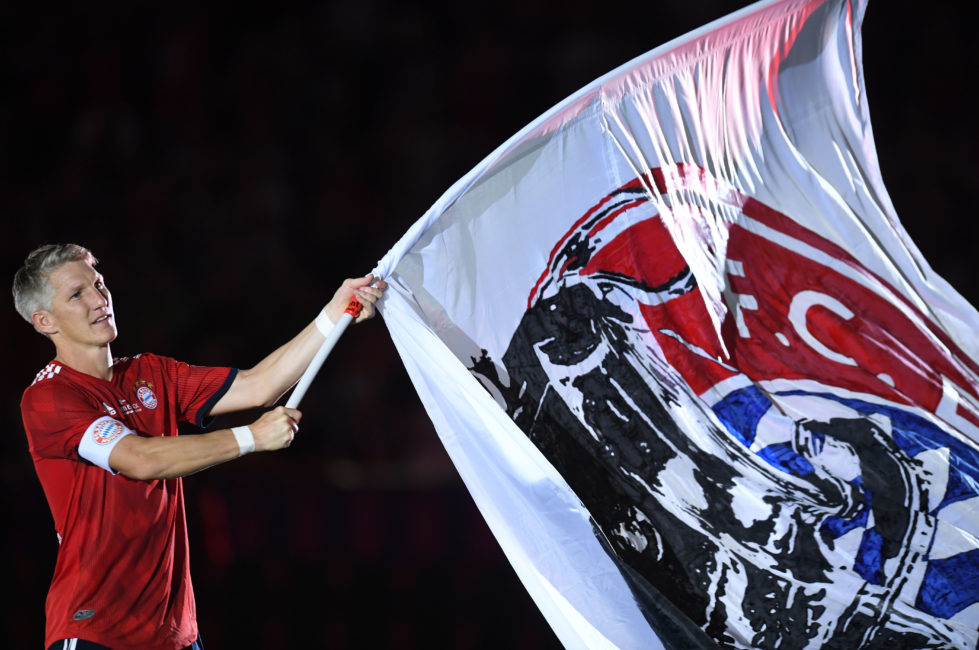
(Image: Christof Stache / AFP)
When the FC Bayern announced that there would be a final farewell game for Schweinsteiger later, I did not hesitate long. I just could not miss that. And so, on a balmy summer evening in August 2018, I sat in the sold-out Allianz Arena, wearing my Schweinsteiger jersey and with my eyes wide open like an astonished child because of the great atmosphere – and waited. I waited for that one moment when Stephan Lehmann called into the microphone: “Our number 31… Bastiaaaan…”.
And with full fervor I cried out into the Munich night sky: “Schweinsteiger, Fußballgott!
It was wonderful to be able to fulfill my long-cherished dream after all, and at the same time it was abysmally sad because my first Schweinsteiger game in the Allianz Arena was also my last – a rollercoaster of emotions. Just the way football should be.
A GOAL THAT SHOOK ALL OF MUNICH
By Justin
FC Bayern and its “rubber thingy” – since Sebastian Deisler’s first goal, football history has been written in the Arena. Countless titles, memorable matches, contract extensions like that of Schweinsteiger and even public match screenings have been celebrated and staged there. Whether Roy Makaay very early in the game against Real 2007 or Luca Toni very late against Hoffenheim in 2008: There are many moments that will remain in the memory of the Bayern supporters in the Arena.
But for me, especially the Finale Dahoam 2012 is still very present. Even though Bayern have won two Champions League titles since then, the pain of 2012 never completely left me. In contrast to other defeats in the club history, I cannot and will not forget this both great and devastating evening. When Thomas Müller scored the 1-0 just before the end, all of Munich exploded. I was not in the Arena, but I was in the Olympiastadion for the public screening. What this goal made me feel then, no other goal has ever managed to stir up in me again until today. A player from one’s club’s own youth academy who decides the Champions League final in your own stadium? Also because of the entire history of Generation Lahmsteiger, this moment could hardly have been any more momentous.
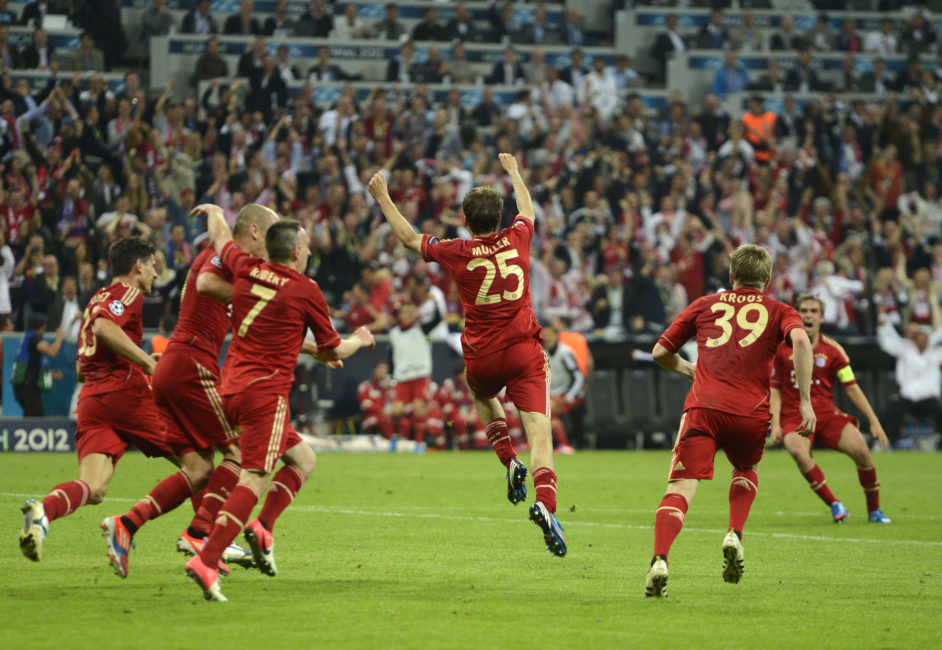
(Image: Odd Andersen/AFP/GettyImages)
For me this has been the most important and emotional goal in the history of the club to this day – if you only consider the moment itself. In retrospect, this goal has unfortunately lost some of its allure because … you know. Nevertheless: Müller’s goal will always be my number one goal of the most emotional goals that I have experienced in football.
FLICKS TURNAROUND AT FIRST GAME WITH MY SON
I am a regular guest at the Allianz Arena, even though I come from North-Rhine-Westphalia. In the last few years, however, due to the minor circumstance of becoming a father, not as regularly as in the beginning. But it was exactly my offspring that brought me one of my many unforgettable memories of the Arena.
It was the match against Borussia Dortmund in the just completed season. The turnaround! The start to catch up and win the treble. In retrospect, this game is even bigger than it was on the night. My eight-year-old son was in the Allianz Arena for the first time. There was a fantastic atmosphere, the likes of which I have rarely experienced. You could tell that something special was going on that day and that it would be a great evening. Every attack by Bayern was celebrated all the way to the top rows in the stands. It was simply the perfect game to introduce your child to the Allianz Arena in all its splendor and power. And I was simply proud to be able to present our team and the Arena to him in this way.
THE PRELUDE TO A WONDERFUL SUMMER
By Maurice
There are few places with which I associate so many memories as the Allianz Arena. I have witnessed great victories and bitter defeats of Bayern in the air cushion. They pass by my mind’s eye like a film: Lewandowski’s five goal haul against Wolfsburg, the title win in 2019, the Schweinsteiger farewell game, the curious penalty shoot-out in the cup against Dortmund 2015, the crazy 5-4 against Heidenheim. Other moments I experienced from the couch at home: the farewell of Titan Kahn, the dramatic Finale Dahoam, the nine goals against HSV.
And yet the Allianz Arena was also the place where, apart from club football, perhaps the most memorable World Cup in the summer of 2006 began. Far before any Freshfield investigations of the German World Cup affair, Munich was host to the world in June 2006. Weeks and months of tension had passed. All of Germany was feverishly awaiting this moment. In the whole country there was an atmosphere of openness and joy, which one may look back on in today’s times with a weeping eye.
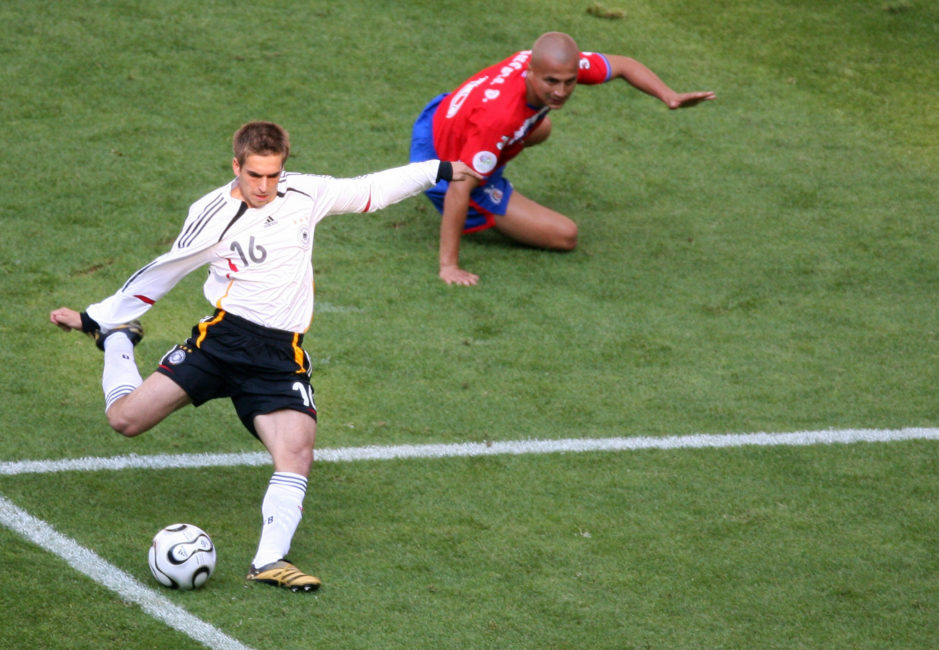
(Image: ROBERTO SCHMIDT/AFP via Getty Images)
The opening game was played by Germany as host against the rank outsider Costa Rica, but after mixed results in the run-up to the tournament, 82 million national team coaches were prepared for the worst. Things turned out to be quite different. After five minutes it was for Philipp Lahm of all people, a Bayern player, to drive the ball into the far corner of the goal from the edge of the penalty area. The prelude to three and a half weeks of black-red-gold celebrations.
Fifteen years after the opening of the Arena and fourteen years after the tournament, it is my fervent wish that “Die Welt zu Gast bei Freunden” will once again become more than just the motto of a football tournament from a time long past.

